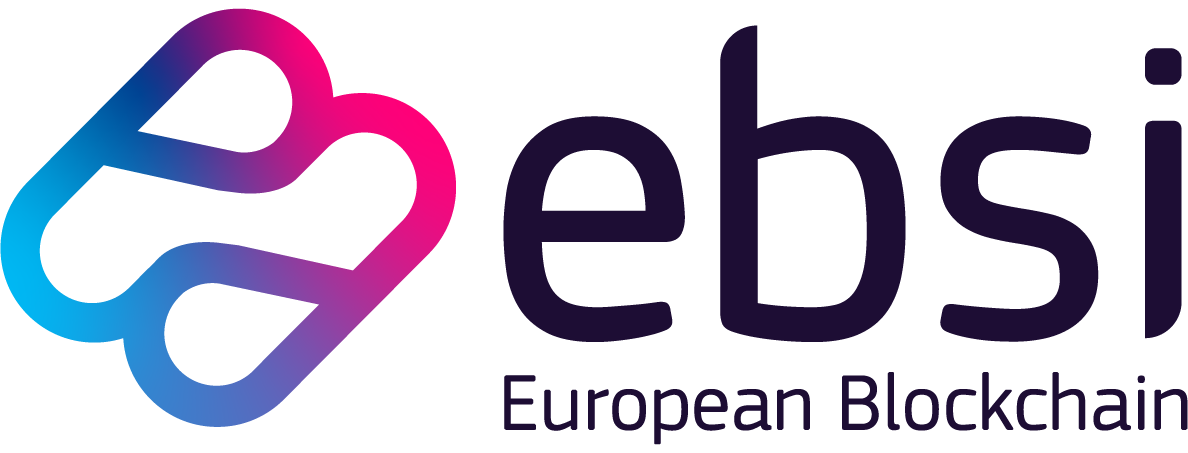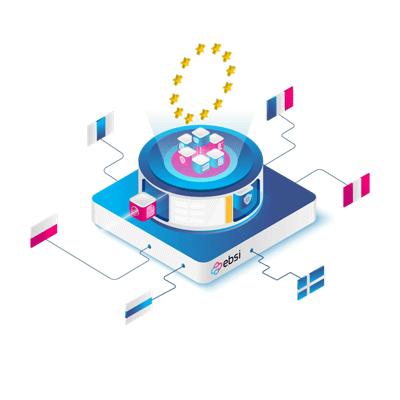What is EBSI?
The European Blockchain Services Infrastructure (EBSI) aims to leverage the power of blockchain for the public good. EBSI is an initiative of the European Commission and the EDIC.
Find out about:
Understanding EBSI: three pillars
As the first pan-European, public-driven blockchain initiative of its kind, at EBSI we tap into blockchain's tamper-evident, immutable and decentralised properties to support better public services for all Europe. The blockchain ledger can be used to store information in a trusted, decentralised way, allowing for new forms of verification, traceability and transparency for citizens.
Business: What can you do with EBSI?
Several domains and industries can benefit from using blockchain in their business processes. Here we introduce EBSI’s major Use Case families and domains, so you can find out how you can benefit from it.
Technology: How does it work?
Every transaction recorded on the EBSI ledger follows the same path. Here we explain the way in which EBSI's APIs, Smart Contracts and ledger work together to provide trusted information to its users.
Infrastructure: a pan-European network of nodes
EBSI's infrastructure is decentralised: instead of a unique database, there are many synchronised copies hosted in our network of European nodes. This is what makes EBSI tamper-proof.
Business: What can you do with EBSI?
Use Case families and domains
EBSI developed several frameworks to address business problems using blockchain. These are grouped into "Use Case Families", thematic key areas where EBSI and blockchain technology can contribute to answer to a key business problem that is relevant to multiple sectors/domains e.g. "Track & Trace" for traceability, "verifiable credentials" for verification, etc.
Select a Use Case Family
Select a business scenario
A business scenario is a sector or domain where EBSI (Use Case families) can be used to support the creation of cross-border services e.g. Education, Social Security, SMEs Financing, Anti-counterfeiting,...
Verifiable Credentials: making verification easy
EBSI's Verifiable Credentials Use Case Family focuses on making information easy to verify, but impossible to fake. All Verifiable Credentials have in common that they are based on a self-sovereign information sharing pattern where the Holders (subjects) of credentials are in control of how, when, and by whom their information is verified, via an EBSI Conformant wallet. This all is done by implementing the W3C's Verifiable Credentials standard, to ensure wide adoption and compatibility.
The Technology: How does it work?
All Use Cases make use of EBSI's core Technical Services:
The basic architecture of EBSI is composed of three main elements: APIs, exposed on the public internet, which allow applications to connect; Smart Contracts, which act as a go-between the outside world (APIs) and the ledger; decentralised database of information that can be accessed by actors looking to complete a business process.
EBSI's Core Technical Services
The Data Flow is the same across all EBSI Use Cases
When an actor is performing a business operation that falls in one of EBSI's use cases, they will use an application to connect to EBSI's APIs. This, in turn, allows them to read information stored on the ledger, or write transactions on the ledger (if they are permitted to do so). Based on the request of the user, the API will call a Smart Contract that will perform the operation and record transactions on the ledger. The ledger is immutable (meaning the information recorded on it can never be amended) and therefore functions as a trust anchor.
Infrastructure: a pan-European network of nodes
EBSI's infrastructure is fully decentralised
All of EBSI's Core Technical Services - APIs, Smart Contracts, and the EBSI ledger - are hosted in a decentralised way, by a network of nodes all across Europe. They synchronise their copies of the ledger, making it distributed, and all make EBSI's Core Technical Services available. Anyone can choose to operate an EBSI Node, but Node Operators must abide by EBSI's Governance rules and respect its General Conditions for Node Operators in order to ensure the integrity and stability of the network.
How EBSI selects its Node Operators
EBSI Nodes are hosted by Node Operators across Europe, who are approved by the EDIC. They adhere to strict standards of security and availability. Thanks to EBSI's pan-European network of nodes, EBSI can offer a robust infrastructure, with no single point of failure that you would find in a traditional, centralised infrastructure.


